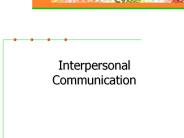Effective communication - PowerPoint PPT Presentation
1 / 26
Title:
Effective communication
Description:
Essence of a PhD/DPhil. Other benefits. build and maintain professional relationships ... newspaper/magazine article. instructions/manual ... – PowerPoint PPT presentation
Number of Views:85
Avg rating:3.0/5.0
Title: Effective communication
1
Effective communication
2
Introduction
- Why communication?
- A PhD/DPhil is about
- training
- developing opinions
- seeking other views
- giving value to all stakeholders
- making an original contribution
3
Overview
- This session will cover
- relevance of effective communication to project
management - techniques for improving communication skills
- chances to practise
- planning
4
Relevance
- Essence of a PhD/DPhil
- Other benefits
- build and maintain professional relationships
- improve impact of research/work and self
- career development
5
Defining communication
- If a message or idea has to be conveyed, how does
it happen? - How many different types or styles of
communication can you identify that relate to
your research project? - Of these, which are you likely to use when
managing your research?
6
Styles include
- To a lesser extent.
- website
- memo
- CV/application form
- sales pitch
- press release
- newspaper/magazine article
- instructions/manual
- speaking face to face
- telephone
- meetings minutes
- progress reports
- formal presentations
- letters
7
Common themes
- Your communication method must suit your message
- Your message and delivery must be tailored to the
audience - Both benefit from preparation
8
Where do problems lie?
- What goes wrong with communication?
- Think of communication problems you have
experienced in your research - Report back
9
Problems
- misunderstanding message
- delivery ambiguous
- audience not listening
- different perspectives
- broadening thinking on the topic GOOD, but
- .. seriously opposing sides can experience
communication breakdown - not knowing responsibilities
- dont act as a result of communication, so it has
failed
10
Communication problems
- Dont assume your message has been understood
- It isnt just about WORDS
- you can deliver the message in other ways
- Be aware of the audience
- look for non-verbal signs
- listen to the response
- question and clarify
11
Activity
- Pair up (if you are a group of three, one of you
acts as an observer) - Read the activity outline
- Activity
- Discuss in pairs/group and report back
12
Non-verbal communication
gestures eye contact facial expression body
language attention
13
Listening
- Involve the listener to
- increase
- understanding
- recall
- discussion of ideas
- commitment
- minimise
- misinterpretation
- missed opportunities
- disenfranchisement
- confusion
14
Activity
- Pair up (if you are a group of three, one of you
acts as an observer) - Read the activity outline
- Activity
- Discuss in pairs/group and feedback
15
The monthly meeting .
I really want to talk about Smith and Jones new
papereverythings going fine, isnt it? I think
there are some interesting implications..
Im sure there was something else.
16
Hijacking
- Dont let yourself be hijacked!
- decide what you need to say
- listen to the response, but retain control
- decide what your ideal outcome is - and work at it
17
Communication strategy first stage
- Have an aim
- What do you want to achieve?
- In groups or pairs, choose one of the following
common situations faced by research students and
decide what you would want to achieve
18
Possible topics
- Progress meeting with supervisor
- Approaching technician for help
- Feel free to suggest others!
19
Communication strategy second stage
- Consider your audience
- Why do they think they are there?
- In your groups or pairs, work out what the agenda
or perspective is of the person receiving your
communication
20
Considering the listener
- To decide what to tell your audience and how to
tell it, - you must consider
- what they already know
- so you know what to leave out
- what they need to know
- so you know what to include
- what they want to know
- so you emphasise the points that will be of real
interest
21
Communication strategy third stage
- Work out what to say
- Be sure to address any mismatch between your aims
and those of your listener(s)!
22
Outline
- What is the aim of your communication?
- Why is this of interest?
- What information do you need to tell the story?
- Scientific and technical information must be
presented SIMPLY
23
Into practice
- How would you apply this to the meeting with a
new project student? - Your aim to get student project started and
minimise disruption to own work - Audience aim to get started and use you as a
source of help and information
24
- What to present
- outline of project
- reading material to get started
- list of what you expect them to understand by
next meeting - times you are available
- How to present
- relaxed?
- friendly?
- assertive?
- Use active listening techniques
25
Common mistakes in communication
- Failing to prepare
- Using jargon
- Including irrelevant information
- A lack of clear objectives
- Failing to meet the audiences needs
- Not ensuring the message is heard
26
Taking this forward
- Use the Development Plan in the handout as a
template to improve your communication - Set some goals now and enter them in your plan
- Identify a situation in the near future when you
can apply effective communication































